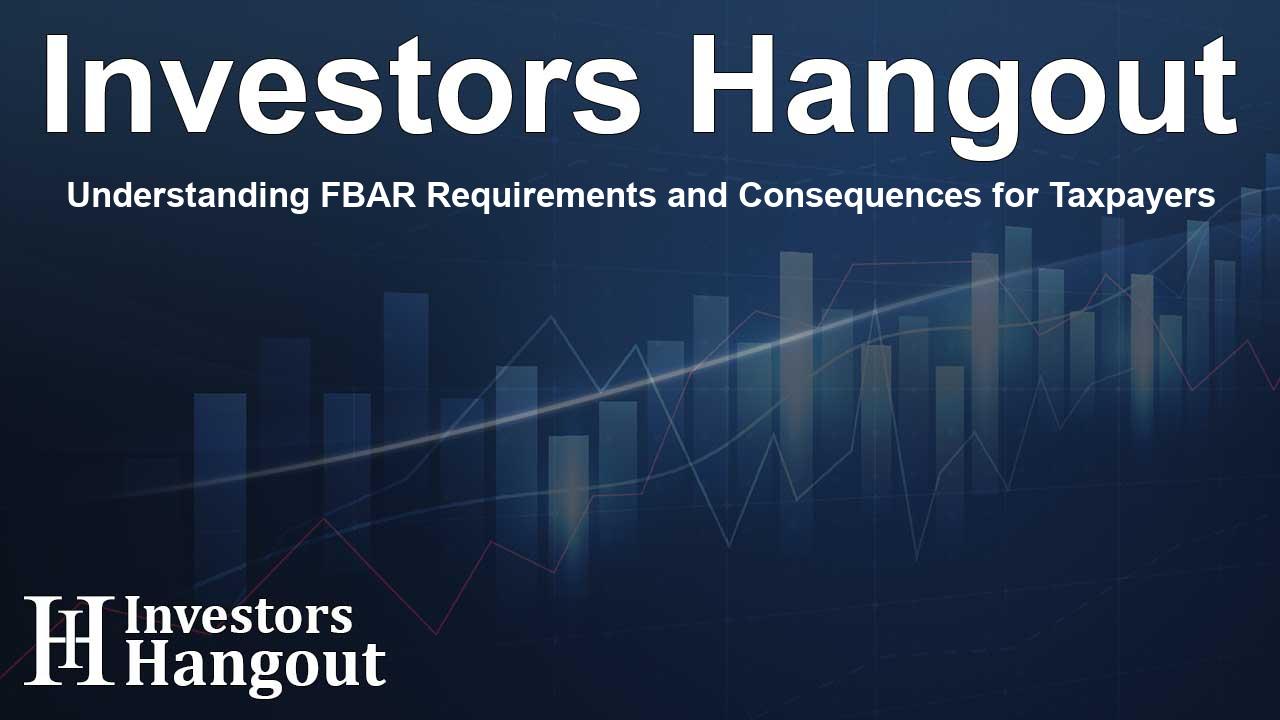Understanding FBAR Requirements and Consequences for Taxpayers

Understanding FBAR Requirements for U.S. Taxpayers
Maintaining international financial accounts can complicate your U.S. tax obligations significantly. Beyond submitting an accurate federal tax return, U.S. persons holding over $10,000 in foreign accounts at any point during the calendar year must file a Foreign Bank and Financial Accounts Report (FBAR)—officially known as FinCEN Form 114. Overlooking this requirement can transform a simple civil tax audit into a complex criminal investigation by the IRS.
The Importance of FBAR: What You Need to Know
The FBAR serves as an annual disclosure of overseas financial holdings mandated by the Bank Secrecy Act (BSA). It aims to deter money laundering, terrorist financing, and tax evasion by requiring transparency regarding U.S.-related foreign accounts. Even legitimate offshore assets require diligent reporting; a failure to file or any inaccuracies can lead to serious repercussions from the IRS Criminal Investigation Division, known for an impressive conviction rate.
Who Should File an FBAR?
If you qualify as a "U.S. person," which includes citizens, resident aliens, and domestic entities such as corporations and partnerships, and if you have a financial interest in or signature authority over any foreign accounts that exceed $10,000 at any time during the year, you must file an FBAR.
FBAR Filing Requirements Explained
Foreign financial accounts that must be reported include bank accounts, brokerage accounts, and certain insurance policies. Keep in mind that some accounts, like those associated with foreign hedge funds, may not require reporting under current regulations; however, these rules are subject to change as regulations evolve.
Recent Developments Affecting FBAR Compliance
In 2024, the Corporate Transparency Act (CTA) will require certain U.S. businesses to disclose beneficial ownership information, creating a national registry aimed at combating financial crimes. Additionally, the Supreme Court's Bittner Decision legally caps fines for non-willful violations of FBAR requirements, providing some relief to taxpayers. Where fines used to accrue per account, they are now applied per report.
Consequences of Not Filing FBARs
Failing to comply with FBAR requirements can lead to significant civil and criminal penalties. In non-willful cases, fines may escalate to $10,000 per violation, while willful violations may incur penalties of $100,000 or 50% of the account balance. Severe financial penalties can include fines of up to $250,000 and possible imprisonment, highlighting the importance of compliance.
Understanding FBAR Filing Deadlines and Exceptions
For 2024, FBARs must be e-filed by April 15, 2025. You can apply for an automatic extension, allowing for submissions until October 15, 2025, if the original deadline is missed. Note that filings must typically be completed electronically, as paper versions are not usually accepted.
Options for Addressing FBAR Non-Compliance
If you failed to file required FBARs, several options are available to you. For taxpayers with no unreported income or IRS audit concerns, submitting delinquent FBARs along with an explanation may lead to waived penalties. Streamlined Filing Compliance Procedures can help non-willful taxpayers reduce penalties significantly given they submit the necessary documentation.
Seeking Professional Help
Engaging the services of qualified tax attorneys and CPAs is essential for navigating the complexities surrounding FBAR requirements and issues. Whether you’ve missed filing deadlines or fear you've been under-reporting income, a knowledgeable tax professional can assist in mitigating penalties and resolving compliance issues efficiently.
Final Thoughts on FBAR Compliance
At the Tax Law Offices of David W. Klasing, our team of dual-licensed tax attorneys and CPAs is here to support clients through the intricacies of FBAR compliance. If you have yet to file the required FBARs or need guidance navigating the process, reaching out for a consultation can help avert potentially dire consequences tied to your tax obligations.
Frequently Asked Questions
What is an FBAR?
The FBAR, or Foreign Bank and Financial Accounts Report, is a form required by the IRS for U.S. persons with foreign accounts exceeding $10,000.
Who is required to file an FBAR?
U.S. persons including citizens, resident aliens, and entities with financial interests in foreign accounts over $10,000 must file.
What are the penalties for not filing an FBAR?
Non-willful violations can lead to fines of up to $10,000, while willful violations may incur fines up to $250,000 or more and possible imprisonment.
How can I rectify a past FBAR filing mistake?
Taxpayers can file delinquent FBARs with explanations, or they may opt for streamlined filing compliance procedures if eligible.
When is the FBAR filing deadline?
The deadline for filing FBARs for 2024 is April 15, 2025, with an extension available until October 15, 2025.
About Investors Hangout
Investors Hangout is a leading online stock forum for financial discussion and learning, offering a wide range of free tools and resources. It draws in traders of all levels, who exchange market knowledge, investigate trading tactics, and keep an eye on industry developments in real time. Featuring financial articles, stock message boards, quotes, charts, company profiles, and live news updates. Through cooperative learning and a wealth of informational resources, it helps users from novices creating their first portfolios to experts honing their techniques. Join Investors Hangout today: https://investorshangout.com/
Disclaimer: The content of this article is solely for general informational purposes only; it does not represent legal, financial, or investment advice. Investors Hangout does not offer financial advice; the author is not a licensed financial advisor. Consult a qualified advisor before making any financial or investment decisions based on this article. The author's interpretation of publicly available data shapes the opinions presented here; as a result, they should not be taken as advice to purchase, sell, or hold any securities mentioned or any other investments. The author does not guarantee the accuracy, completeness, or timeliness of any material, providing it "as is." Information and market conditions may change; past performance is not indicative of future outcomes. If any of the material offered here is inaccurate, please contact us for corrections.